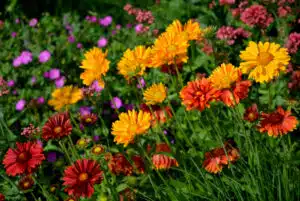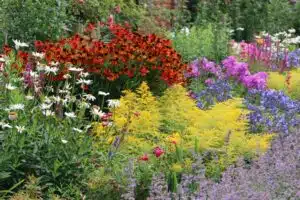If you’ve ever taken a deep breath in a forest and felt instantly refreshed, you’ve experienced nature’s air purification system at work. Trees do more than just look beautiful—they actively clean the air we breathe. For homeowners looking to improve their outdoor environment, strategically planting trees for air quality can make a measurable difference right in your own yard.
At J&J Nursery and Garden Center in Layton, UT, we help families choose the right trees to enhance their property’s health and beauty. Let’s explore how trees work as natural air filters and which species can offer the greatest benefits for your home.
The Science: How Trees Clean the Air
Trees function as living air purifiers through several natural processes. Their leaves absorb carbon dioxide (CO₂) during photosynthesis, converting it into oxygen that we breathe. But that’s just the beginning.
Tree leaves also capture airborne pollutants like nitrogen oxides, ammonia, sulfur dioxide, and ozone. These harmful gases can contribute to respiratory issues and other health problems, especially in urban areas with heavy traffic. When pollutants land on leaf surfaces, they’re absorbed through tiny pores called stomata or broken down by beneficial microorganisms living on the tree.
Perhaps most impressively, trees trap particulate matter—tiny particles of dust, pollen, smoke, and soot that float through the air. These microscopic particles can penetrate deep into our lungs and cause serious health problems. Tree bark, branches, and leaves act like a natural filter, capturing these particles before they reach our homes and lungs.
A single mature tree can absorb roughly 48 pounds of CO₂ per year and release enough oxygen to support two people. When you plant multiple trees around your property, you’re essentially installing a powerful, self-sustaining air filtration system.
Best Tree Species for Urban and Suburban Air Quality
Not all trees are created equal when it comes to air purification. Some species are particularly effective at filtering pollutants while also thriving in residential landscapes.
Deciduous Trees
Oak trees rank among the top air purifiers due to their large canopy and dense foliage. Red oak and bur oak varieties grow well in northern Utah and can absorb significant amounts of CO₂ and particulates.
Ash trees, particularly the green ash, offer excellent pollutant absorption while tolerating urban conditions. They’re hardy, fast-growing, and provide generous shade.
Maple trees, especially silver maple and red maple, combine air-cleaning benefits with stunning seasonal color. Their broad leaves capture pollutants effectively throughout the growing season.
Evergreen Trees
Pine trees work year-round to clean the air since they retain their needles through winter. Austrian pine and ponderosa pine adapt well to Utah’s climate and provide continuous air filtration.
Spruce trees, like Colorado blue spruce, excel at trapping particulates on their needle-covered branches. They’re also highly wind-resistant, making them ideal for creating windbreaks.
Smaller Options
If space is limited, consider crabapple or serviceberry trees. These smaller species still contribute to air quality while fitting comfortably in suburban yards.
Strategic Placement for Maximum Benefit
Where you plant your trees matters just as much as which species you choose. Smart placement amplifies their air-cleaning effects while delivering additional benefits to your property.
Plant trees upwind of your home—typically on the west and northwest sides in Utah. This position allows trees to filter air before prevailing winds carry it toward your house. Trees positioned between busy roads and your property create a barrier that intercepts vehicle emissions before they reach your living spaces.
Consider planting in clusters or rows rather than spacing trees far apart. Groups of trees work together to create a more effective filtration zone. A row of evergreens along a property line, for example, acts as both a windbreak and an air purification system.
Keep trees at least 10-15 feet away from your home’s foundation to avoid root issues, but close enough that their canopy extends toward the house. This spacing provides shade benefits while maintaining a healthy distance from structures.
Beyond Air Quality: Additional Environmental Benefits
While cleaner air is reason enough to plant trees, they deliver numerous other advantages that enhance your property and quality of life.
Shade and Cooling
Strategically placed trees can reduce home cooling costs by 25-50% during summer months. A mature tree on the west side of your house blocks intense afternoon sun, lowering indoor temperatures naturally. This cooling effect also reduces the urban heat island effect that makes cities warmer than surrounding areas.
Windbreak Protection
Evergreen trees planted in rows create effective windbreaks that reduce heating costs in winter. They block cold north winds, potentially cutting winter energy bills by 10-20%. Wind protection also makes outdoor spaces more comfortable and shields your home from storm damage.
Stormwater Management
Tree roots absorb rainwater that would otherwise run off into storm drains, carrying pollutants into local waterways. A single large tree can intercept hundreds of gallons of rainfall annually, reducing erosion and flooding while filtering water naturally.
Wildlife Habitat
Trees provide food and shelter for birds, beneficial insects, and other wildlife that contribute to a healthy ecosystem. This biodiversity helps control pests naturally and creates a more vibrant outdoor environment.
Get Started with Trees for Air Quality
Improving the air around your home doesn’t require complicated technology or expensive equipment. Nature provides the solution through trees; you just need to plant them.
Visit J&J Nursery and Garden Center in Layton to explore tree varieties suited to your property size, soil conditions, and aesthetic preferences. Our team can help you select species that will thrive in northern Utah’s climate while delivering maximum air quality benefits.
Start with even one or two well-placed trees, and you’ll begin experiencing cleaner air, lower energy costs, and a more beautiful landscape. Your lungs—and your family—will thank you. Contact us today to start your journey towards a greener, healthier environment.



